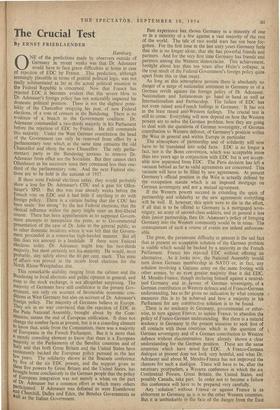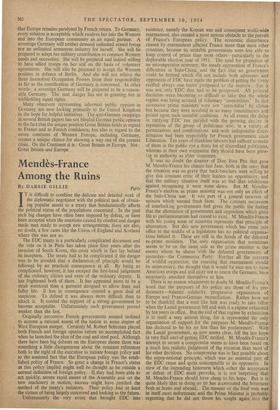The Crucial Test
y ERNST FRIEDLAENDER
Hamburg.
ONE of the predictions made by observers outside of Germany in recent weeks was that Dr. Adenauer would have to face grave difficulties at-home in case Of rejection of EDC by France. This prediction, although Seemingly plausible in terms of general political logic, was not really substantiated as far as the actual political situation in the Federal Republic is concerned. Now that France has rejected EDC it becomes evident that this severe blow to Dr. Adenauer's foreign policy has not noticeably impaired his domestic political position. There is not the slightest possi- bility of the Chancellor resigning his post. of new Federal elections, of a vote of censure in the Bundestag. There is no evidence of a breach in the Government coalition. Dr. Adenauer commanded a two-thirds majority in his Parliament before the rejection of EDC by France. He still commands this majority. , Under the West German constitution the head of the Government can only be removed from office by a parliamentary vote which, at the same time censures the old Chancellor and elects the new Chancellor. The only parlia- mentary party in the Bundestag anxious to remove Dr. Adenauer from office are the Socialists. But they cannot elect 011enhauer as his successor since they command less than one- third of the parliamentary vote. And the next Federal elec- tions are to be held in the autumn of 1957. , If there were Federal elections today, they would probably show a loss for Dr. Adenauer's CDU and a gain for 011en- haner's SPD. But this was true already weeks before the tench vote on EDC and it had little if anything to do with foreign policy. There is a certain feeling that the CDU has been made 'too strong' by the last Federal elections, that the Clerical influence within the party might steer an anti-liberal course. There has been apprehension as to supposed Govern- ment attempts to manipulate the press, as to Governmental Presentation of the case of Dr. John to the general public, as to other domestic incidents where it was felt that the Govern- ment proceeded in a somewhat high-handed manner. But all this does not amount to a landslide. If there were Federal elections today, Dr. Adenauer might lose his two-thirds majority, but most certainly not his majority. He would, most Probably, stay safely above the 60 per cent. mark. This state of affairs was proved in the recent local elections for the North Rhine-Westphalian diet. '
This remarkable stability ranging from the cabinet and the Bundestag to local elections and nubile opinion in general, and even to the stock exchange, is not altogether surprising. The majority of Germans have still confidence in the present Gov- ernment, not only on account of favourable economic con- ditions in West Germany but also on account of Dr. Adenauer's foreign policy. The majority of Germans believe in Europe. They are in no way convinced that the rejection of EDC in the Paris National Assembly, brought about by the Corn-' Munists, means the end of European unification. It does not change the sombre facts at present, but it is a consoling element to know that, aside from the Communists, there was a majority of Europeans in the French Parliament. But it is more than a merely consoling element to know that there is a European majority in the Parliaments of the Benelux countries and of Italy and that both Great Britain and the United States have consistently backed the European policy pursued in the last ,few years. The solidarity shown at the Brussels conference 03' five of the six EDC powers, and the support given to t3llese five powers by Great Britain and the United States, has rought home conclusively to the German people that the policy of European integration was not merely a whim on the part of Dr. Adenauer but a common effort in which many others Participated. If Adenauer was defeated so were Eisenhower 4,nd Churchill, Dulles and Eden, the Benelux Governments as ken as the Italian Government. Past experience has shown Germany in a minority of one or in a minority of a few against a vast majority of the rest of the world. The tale of two world wars has not been for- gotten. For the first time in the last sixty years Germany feels that she is no longer alone, that she has powerful friends and partners. And for the very first time Germany has friends and partners among the Western democracies. This achievement, brought about less than ten years after Hitler's collapse, is the true result of the Federal Government's foreign policy quite apart from this or that treaty.
As long as this atmosphere persists there is absolutely no danger of a surge of nationalist sentiment in Germany or of a German revolt against the foreign policy of Dr. Adenauer. Nationalism and Isolationism go hand in hand as well as Internationalism and Partnership. The failure of EDC has not even raised anti-French feelings in Germany. It has not in the least raised anti-Western feelings. The crucial test is still to come. Everything will now depend on how the Western powers are to solve the German problem, how they are going to deal with the questions of German sovereignty, of German contribution to Western defence, of Germany's position within the West in general and within Europe in particular.
The atmosphere of partnership and of solidarity will now have to be translated into solid facts. EDC is no longer a fact, nor is the Bonn convention, which was acceptable more than two years ago in conjunction with EDC but is not accept- able now separated from EDC. The Paris decision has left a vacuum behind as far as valid agreements are concerned. This vacuum will have to be filled by new agreements. At present Germany's official position in the West is actually defined by the occupation statute which is an imposed mortgage on German sovereignty and not a mutual agreement.
If the Western powers succeed in extending the spirit of partnership and solidarity to the new agreements everything will be well. If, however, this spirit were to die in the effort, if all that is to be offered to Germany is a mortgaged sove- reignty, an army of second-class soldiers, and in general a less than junior partnership, then Dr. Adenauer's policy of bringing Germany into the Western community would be in ruins. The consequences of such a course of events are indeed unforesee- able.
The great, the paramount difficulty at present is the sad fact that at present no acceptable solution of the German problem is visible which would be backed by a majority in the French Parliament. France has rejected EDC without offering an alternative. As it looks now, the National Assembly would turn down German membership in NATO or, in fact, any solution involving a German army on the same footing with other armies, by an even greater majority than it did EDC. M. Mendes-France, though declaring himself against a neutral- ised Germany and in favour of German sovereignty, of a German contribution to Western defence and of Franco-German understanding, has so far given no indication by what concrete measures this is to be achieved and how a majority in his Parliament for any constructive solution is to be found. . There is no tendency in Germany, governinental or other- wise, to turn against France, to isolate France, to abandon the policy of Franco-German understanding. But there is a natural tendency in Germany in the present situation to seek first of all contacts with those countries which in the question of German sovereignty and of a German contribution to Western defence without discrimination have already shown a clear understanding for the German position. These are the same countries which have stood for EDC. A Franco-German dialogue at present does not look very hopeful, and what Dr. Adenauer said about M. Mendes-France has not improved the chances for such a dialogue. There will have to be, after the necessary pourparlers. a Western conference in 'which the six Continental Powers, Great Britain, the United States, and possibly Canada, take part. In order not to become a failure this conference will have to be prepared very carefully. Any 'solution' without France or against France is as abhorrent to Germany as it is to the other Western countries. But it is unthinkable in the face of the danger from the East that Europe remains paralysed by French vetoes. To Germany, every solution is acceptable which receives her into the Western and into the European community as an equal partner. A sovereign Germany will neither demand unlimited armed forces nor an unlimited armament industry for herself. She will be prepared to adapt her military contribution to common Western needs and necessitieg. She will be prepared and indeed willing to have allied troops on her, soil on the basis of voluntary agreements. She will also be prepared to accept the Western position in defence of Berlin. And she will not relieve the three heretofore Occupation Powers from their responsibility as far as the reunification of Germany is concerned. In other words : a sovereign Germany will be prepared to be a reason- able Germany. The real danger lies not in granting but in withholding equal rights. .
Many observers representing informed public opinion in Germany are now looking .primarily to the United Kingdom in the hope for helpful initiatives. The anti-German campaign in several British papers has not blinded German public opinion to the fact that the unique position Great Britain holds in regard to France and to French confidence, but also in regard to the entire continent of Western Europe, including Germany, creates a unique chance for showing a way out of the present crisis. On the Continent it is : Great Britain in Europe. Not : Great Britain and Europe.



































 Previous page
Previous page